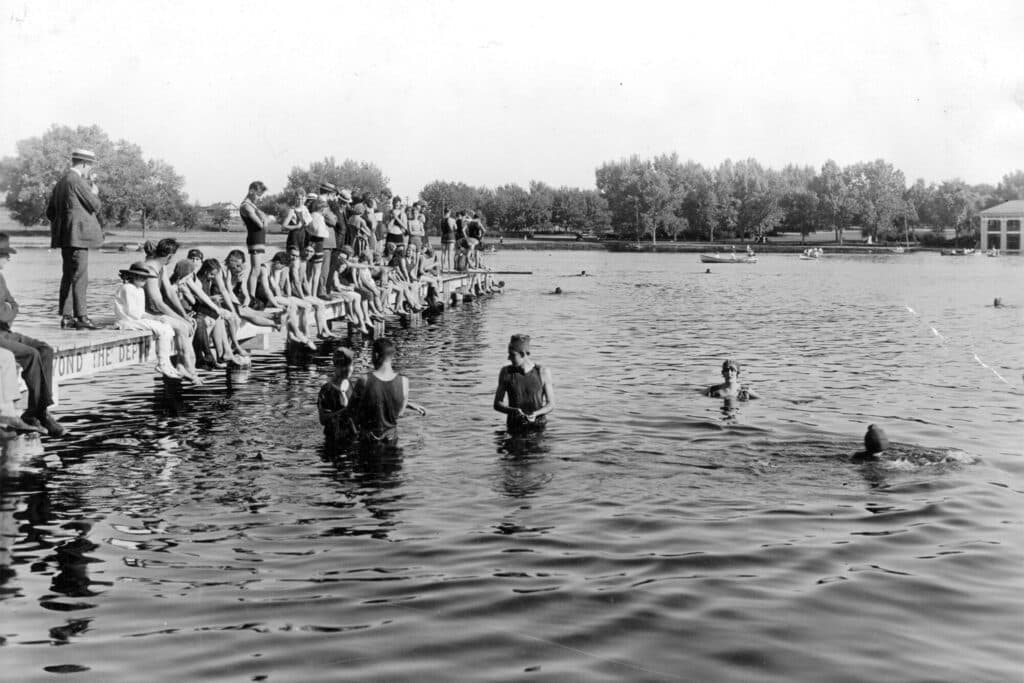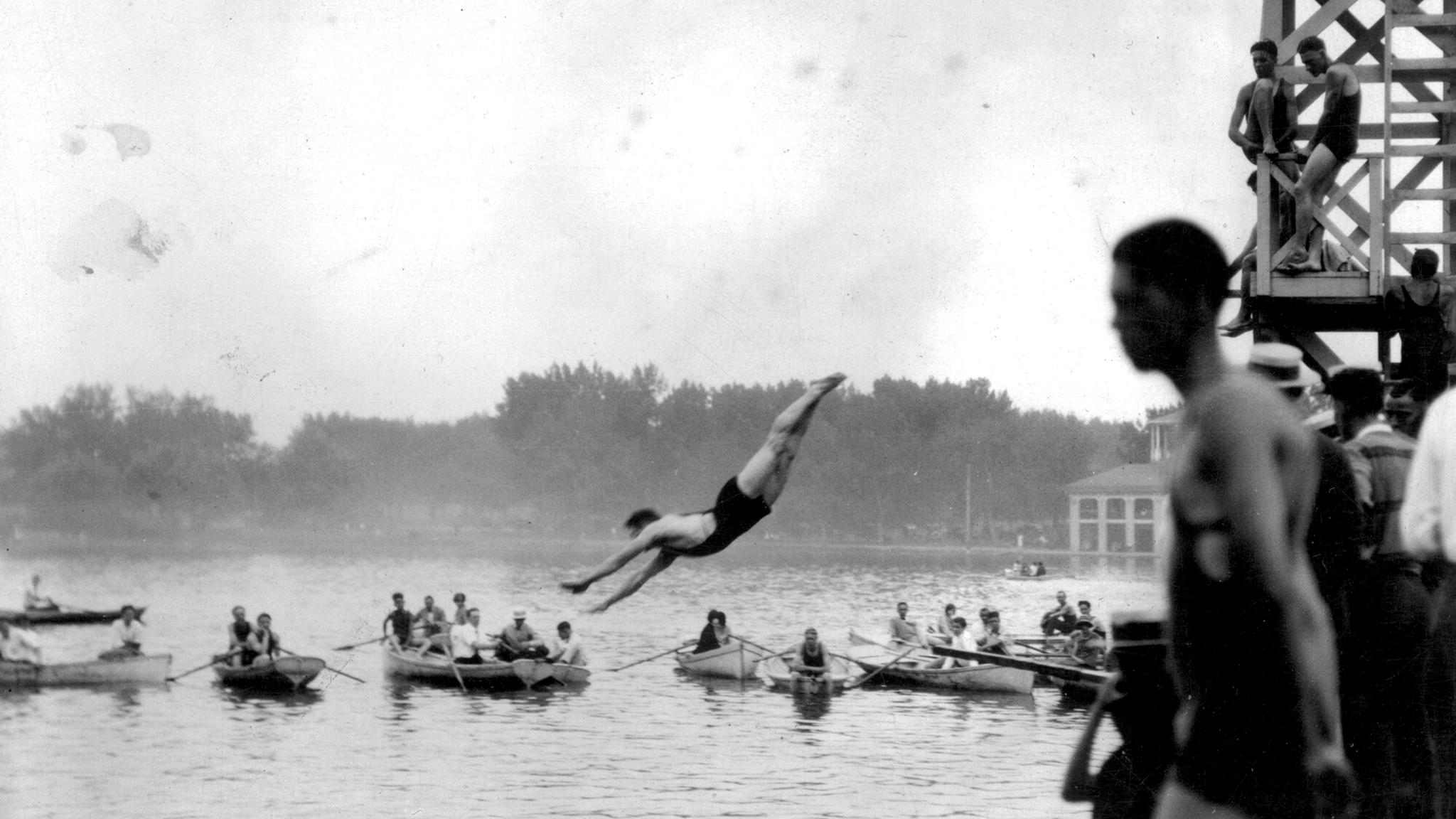Bonnie Sutherland has spent 30 years marveling at Washington Park.
Sutherland, the president of Friends And Neighbors of Washington Park, and her husband live in the home where he grew up, right at the park's edge. It's a place she adores. So when Sutherland realized Wednesday would be its 125th birthday, she wanted to do something special.
"My first idea was like, I'll make cupcakes and hand 'em out in the boathouse," she told us. "But everybody we talked to was so excited about it, Parks and Rec was so excited about it, because it is such a well-loved park. So it just kind of grew into this really fun, day-long celebration."
The cupcakes were out. They'd do a festival instead.


So, on Wednesday morning, they kicked off the birthday party with a walk around the grass, led by South High School's drum line. People took swan boats out on Smith Lake.
The boathouse became a mini museum, adorned with photographs from the Denver Public Library's collection and artifacts from History Colorado.
The one thing that stuck out to us: There were so many images of people swimming in Smith Lake, so we decided to dive in on that history. Here are a few things we learned:
People swam at Wash Park until the 1950s.
Jennifer Fackler's lived nearby for 25 years, but she didn't know her grandmother, Dorothy Jones, was a frequent Wash Park swimmer until a few years ago.
She was digging through an old scrapbook when she discovered images of Jones as a teenager, dressed in a full-length swimsuit and cap.
Her love for the place predated the discovery, but this made her appreciate it even more.

"It makes it even more special, knowing my grandmother was here," she said.
Photos in the display showed a tower erected in the middle of the water, with bathers hanging off as they played. History Colorado brought a wool suit, possibly like the one worn by Jones in her day, and a rubber cap.
We found Phil Goodstein, Denver's preeminent historian, in the boathouse corner. Smith Lake's northern shore was a hot swimming hole for decades, he told us, until the city came to appreciate some potential health risks.

"Beginning around 1940, there is this increasing recognition there is some link between water pollution and polio ... one of the ways they decide they're going to make the water safe against polio is by dumping a heavy chlorine into the lake," he said. "Part of the job of the lifeguards, before the lake opens each morning for swimming, is to go around with a boat where they have a huge tank of chlorine."
The chlorine brought some unexpected consequences, he added. It sent Smith Lake's fish belly-up and, because the water was still used as an irrigation reservoir back then, killed nearby lawns.
"About 1957, they said that the date of swimming in the park has passed. They close it permanently to swimming, but announced, 'We will build a swimming pool in the park as soon as you can imagine,' which turns out to be about 1970," Goodstein said, rolling his eyes.

Not all of those Wash Park swimming memories are good ones.
It was notably recreation only for the city's white residents. Though the park wasn't officially a whites-only space, much of the city at that time was informally segregated. People knew where they weren't welcome.
According to the Rocky Mountain News, a group of Black Denverites decided to do something about their exclusion from the swimming hole in August of 1932.
"Fists and brickbats flew in a pitched battle at Washington Park yesterday when 150 Negroes, allegedly incited by Communists, invaded the bathing beach and went swimming over the protest of city and police official," the report reads. "Heads were battered, rocks were thrown and clubs, finally supplanted by police blackjacks, were wielded."

17 people were arrested in violence that echoed a similar incident that would unfold at La Raza Park a half-century later.
The Rocky's story centered around an alleged plot by the local Communist party to spur "peace abiding citizens" to disrupt the social order. They quoted Carl S. Milliken, Denver's manager of safety, who described the Black rioters as "victims of vicious Communist propaganda."
"It is true there is no law to keep you citizens from using this beach, but you have never attempted this before, and you know you are not doing this for any reason in the world except to bring trouble," Milliken reportedly told the crowd. "You know the white people are not going to stand for this."
The episode loomed large in papers of the day, but the memory didn't necessarily stick. Black Denverites, interviewed years later, weren't sure about any Communist influence. According to Denver Urban Spectrum, it was "a protest barely talked about afterwards."
Also, Smith Lake might be haunted?
Goodstein, waxing about the park's swimming history, recalled a story from one of his famous volumes of local ghost stories: "Haunts of Washington Park." Have you ever seen something spooky on the lake at night?
"Right at dusk, when the rain starts picking up," he said, winding up for the reveal: "Is there a flying Dutchman floating around in the lake?"

As legend has it, he told us, a group of troublemakers found their way into the park after dark on the summer solstice of 1914.
"Though the lake is closed, these guys are gung-ho swimmers, boaters, other such things — and decide it's going to be a great prank to go out on the lake after closing hours and to show how athletic they are," he told us.


One of them, Chester Sirkle, goes to climb on a diving board hovering over the water's edge.
"He hits his head on that and he goes under," Goodstein said, reading from his book. "His companion looks for him, he can't find him. There's no help."
Despite the efforts of local police and an on-duty janitor, Sirkle's life, nor his soul, was saved that night.

A Rocky Mountain News story on the death blamed a lack of lifeguards.
"And the story goes is that ever since then, when people are misbehaving on the boats, when they shouldn't be out on the boat, suddenly placid Smith Lake starts roiling, and people temporarily see either Sirkle or his canoe circulating around on it."
Editor's note: Bonnie Sutherland is the mother of Charley Sutherland, a summer 2024 intern at KRCC, which is run by Colorado Public Radio, the parent organization of Denverite. Charley Sutherland did not contribute to this story.













